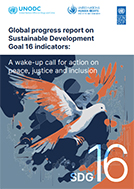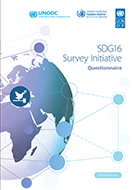Documents and publications
Human rights indicators
Global progress report on Sustainable Development Goal 16 indicators: A wake-up call for action on peace, justice and inclusion
video
 Available in: English
Available in: English
A Human Rights Based Approach to Data - Leaving No One Behind in the 2030 Agenda for Sustainable Development
SDG16 Survey Initiative Implementation Manual
 Available in: Arabic Chinese English French Spanish
Available in: Arabic Chinese English French Spanish
The Manual is intended to inform practitioners (in particular the NSOs and/or other implementation partners from National Statistical Systems) and a broader professional audience about the technical requirements of implementing the SDG 16 Survey in an internationally comparable and nationally relevant manner. Hence, this Manual focuses on the SDG 16 indicators covered, the specifics of the SDG 16 Survey, and the components of an appropriate quality framework, building from generic guidelines on statistical data collection and measurement theory. The Manual is part of a Resources Package provided by the UNDP, UNODC and OHCHR to guide national implementation, which includes, among others, the following:
- The Implementation Manual (the current document).
- CAPI/CATI (computer-aided personal / telephone interviewing) Scripts: the scripted version of the international source SDG 16 Survey Questionnaire, in Survey Solutions.
- Tabulation plan: standardized templates for indicator reporting with the recommended disaggregation, including tabulation templates for the optional contextual variables, offered by the international standard source questionnaire.
- Syntax: STATA .do files to compute SDG indicators and other variables included in the tabulation plan.
- The Manual also provides explanations and instructions related to the instrument to inform the enumerators, including enumerator manuals and curricula to be adopted by the NSOs while preparing for SDG 16 data collection. Note that this Manual is expected to go through periodic updates. Please refer to the OHCHR, UNDP and UNODC websites.
SDG16 Survey Initiative Questionnaire
 Available in: Arabic Chinese English French Spanish
Available in: Arabic Chinese English French Spanish
Guidance Note to Data Collection and Disaggregation
 Available in: Arabic Chinese English French Russian Spanish
Available in: Arabic Chinese English French Russian Spanish
Policy specialists, statisticians and data scientists working in government or with civil society organizations, as well as development practitioners and human rights advocates should find A Human Rights-Based Approach to Data (HRBAD) particularly timely. It responds to an urgent need to provide practical human rights guidance to data collection and disaggregation in order to leave no-one behind in the implementation of the 2030 Agenda for Sustainable Development.
The 2030 Agenda is to be implemented in a manner consistent with the rights and obligations of States under international law. Deciding whether to pursue disaggregation of indicators is not a norm or value-neutral exercise. Given that data collection and disaggregation have associated risks to the enjoyment by data subjects of their fundamental rights, HRBAD has much to offer. It should help bring together relevant data stakeholders and develop communities of practice committed to improve the quality, inclusiveness, relevance and use of data and statistics consistent with international human rights standards, norms and principles.
Human Rights Indicators: A Guide to Measurement and Implementation
 Available in: Arabic English French Russian Spanish
Available in: Arabic English French Russian Spanish
The Office of the High Commissioner for Human Rights (OHCHR) has published Human Rights Indicators: A Guide to Measurement and Implementation. The publication aims to assist in developing quantitative and qualitative indicators to measure progress in the implementation of international human rights norms and principles.
The Guide describes the conceptual and methodological framework for human rights indicators recommended by international and national human rights mechanisms and used by a growing number of governmental and non-governmental actors. It provides concrete examples of indicators identified for a number of human rights—all originating from the Universal Declaration of Human Rights—and other practical tools and illustrations, to support the realization of human rights at all levels.
The Guide will be of interest to human rights advocates as well as policymakers, development practitioners, statisticians and others who are working to make human rights a reality for all.
To download a copy (9.4 MB), click on the cover page.
| Download: Human Rights Indicators: A Guide to Measurement and Implementation * | |
| Summary | English French Russian Spanish |
| Complete Guide | Arabic English French Russian Spanish |
| Cover, Foreword, Acknowledgments | Arabic English French Russian Spanish |
| Contents, Abbreviations and Acronyms | Arabic English French Russian Spanish |
| Introduction | Arabic English French Russian Spanish |
| Chapter 1 - Human rights and indicators: rationale and some concerns | Arabic English French RussianSpanish |
| Chapter 2 - Conceptualizing indicators for human rights | Arabic English FrenchRussian Spanish |
| Chapter 3 – Methodological approaches to human rights indicators | Arabic English French RussianSpanish |
| Chapter 4 – Illustrating the framework: Indicators for some rights | Arabic English French Russian Spanish |
| Chapter 5 – Framework in practice: implementing and monitoring rights | Arabic English French Russian Spanish |
|
Annexes, Glossary: Glossary of statistical terms |
Arabic English French Russian Spanish |
*/ All documents are in PDF
How Covid-19 is changing the world: a statistical perspective


 Available in English: Vol.I | Vol.II | Vol.III
Available in English: Vol.I | Vol.II | Vol.III
Throughout the current crisis, the international statistics community has continued to work together, in partnership with national statistical offices and systems around the world to ensure that the best quality data and statistics are available to support decision making during and after the crisis. This report - compiled jointly by 36 international organizations, under the aegis of the Committee for the Coordination of Statistical Activities (CCSA) - gives a small flavour of that cooperation.
It provides a snapshot of some of the latest information available on how COVID-19 is affecting different aspects of public and private life, from economic and environmental fluctuations to changes that affect individuals in terms of income, education, employment and a consistent message is clear – this is an unprecedented crisis, and no aspect of our lives is immune, including human rights.
The risk that the pandemic will accentuate existing patterns of human rights violations and discrimination is real. Most of the regions that have a lower proportion of ratified international human rights treaties and independent National Human Rights Institutions witnessed a higher number of killings of human rights defenders, journalists, or trade unionists. These regions also face a higher prevalence of discrimination.
The COVID-19 pandemic tests our human rights resilience and that in every stage of this epidemic – including the recovery – efforts should be made to involve National Human Rights Institutions, civil society, and human rights defenders.
For further information about the CCSA and the publication, visit this page: https://unstats.un.org/unsd/ccsa/
Praia Handbook on Governance Statistics
 Available in: English
Available in: English
The Office of the United Nations High Commissioner for Human Rights (OHCHR) welcomes the publication of the Handbook on Governance Statistics by the Praia City Group established under the auspices of the UN Statistical Commission. OHCHR wishes to recognize Cabo Verde's National Statistics Institute and all the national statistical offices and organizations, including civil society organizations, who participated in or supported the development of the handbook. OHCHR took part in this collective effort, leading in particular the work on the crosscutting chapter on human rights and on the specific chapter on non-discrimination and equality. As underlined in the Handbook, internationally agreed human rights standards provide a common and normative underpinning to the definition of governance statistics, as well as to data governance itself, upholding human rights in data and statistical processes.
OHCHR strongly encourage further cooperation between national statistical offices, national human rights institutions and other relevant stakeholders, including civil society organisations who represent or work with the groups who are left behind. OHCHR plans to continue participating in this effort and engage further in the measurement of civil, cultural, economic, political and social human rights. Better measurement of governance will help achieve the SDGs, and their declared objective to realize human rights for all, without discrimination.
For further information about the Praia City Group and the handbook, visit this page: http://ine.cv/praiagroup/hand_book/
Governance Statistics in the COVID-19 Era
 Available in: English
Available in: English
The Office of the United Nations High Commissioner for Human Rights (OHCHR) welcomes the publication of the new Guidance on “Governance Statistics in the COVID-19 Era” by the Praia City Group, established under the auspices of the UN Statistical Commission. OHCHR contributed to this publication, which provides a foundation for developing international statistical Guidance and standards for eight dimensions of governance, anchored in the international human rights normative framework: namely non-discrimination and equality, participation, openness, access to and quality of justice, responsiveness, absence of corruption, trust, and safety and security.
Users of governance statistics, notably national policymakers, media, researchers, national oversight institutions, and civil society groups, can make use of this Guidance. Those wanting to participate in policymaking around the COVID-19 response in their country can use this Guidance Note to demand more governance statistics and to hold the government to account on its response plan and recovery strategy, at a time when many normal oversight and accountability processes have been severely disrupted.
Documents
Report of the Secretary-General on the question of the realization in all countries of economic, social and cultural rights
E F S R S A C
Existence of independent National Human Rights Institutions in compliance with the Paris Principles - Metadata
E
Everyone Counts: Ensuring a Response of Official Statistics to Sustainable Development Goals Consistent with Human Rights
E
Statistical Note on Human Rights, including the Right to Development for the Open Working Group on Sustainable Development Goals (OWG)
E
Report of the Special Rapporteur on the human right to safe drinking water and sanitation, Common violations of the human rights to water and sanitation (A/HRC/27/55)
EFRS AC
Report of the Office of the United Nations High Commissioner for Human Rights to the Human Rights Council -Technical assistance and capacity-building options for integrating human rights into national policies, 24 July 2014 (A/HRC/27/41)
E
Report of the United Nations High Commissioner for Human Rights to the Economic and Social Council, Geneva 4-29 July 2011 (E/2011/90)
EFRSAC
Report on Indicators for Promoting and Monitoring the Implementation of Human Rights (HRI/MC/2008/3)
EFS
Report of the Asian Sub-regional Workshop, New Delhi, India, 26-28 July 2007
E
Report on Indicators for Monitoring Compliance with International Human Rights Instruments (HRI/MC/2006/7)
EFS